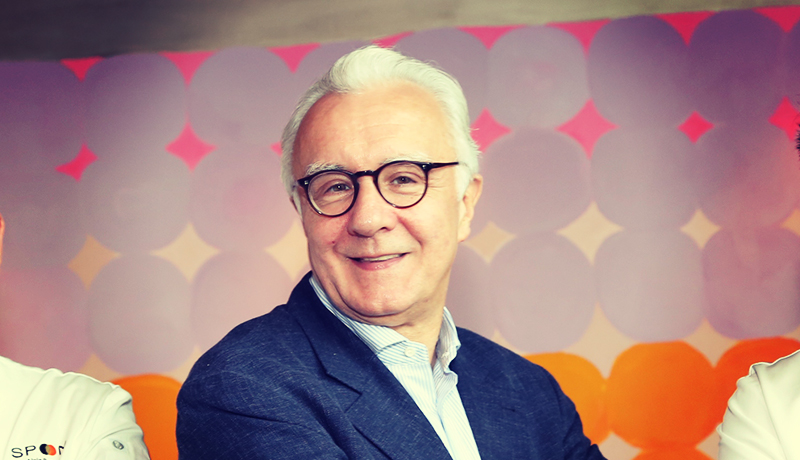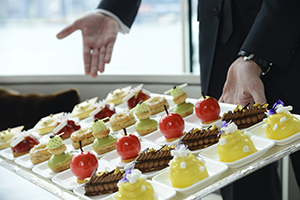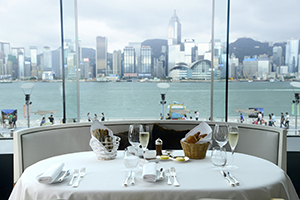

Chef Alain Ducasse
Photo Courtesy of Alain Ducasse Enterprise
It has been 12 years since Forbes Travel Guide Five-Star Spoon by Alain Ducasse debuted at Five-Star InterContinental Hong Kong and the contemporary French restaurant still manages to stay ahead of the curve. Pioneering chef Alain Ducasse tells us about some of those culinary secrets, growing up on a farm, sourcing natural ingredients and putting together his autumn menu.
When did you decide you wanted to be a chef?
I was born in the south of France on a farm and, at the age of 12 years, I decided to become a chef. I was really inspired by my grandmother, who cooked extremely well. Living on that farm gave me a chance to be outside, go fishing and collect seasonal ingredients in the garden. In the spring, the garden was full of color and was one of the best seasons for fresh vegetables. It doesn’t really get more local than that. The farm is still in the family, and my sister is running it, but she is now buying her chicken outside in the supermarket 50 years later. I love to argue with her a little bit but try to keep calm.
How did your upbringing affect your cooking philosophy?
Growing up on the farm left a big footprint on my memories as well as my vision of cooking. Our restaurants in Paris and abroad embrace this concept of naturalness, which is a respect for what comes out of the garden. In Versailles, there is a section of the garden where the vegetables were only grown for the royal family. We prepare our plants and sow the seeds on the same parcel of land, working with the head gardener of Chateau Versailles. It’s not just about organic foods — it needs to be local and seasonal, too.
How do you source ingredients?
It is crucial for me to have the best products on the market, so I do whatever it takes. Every year I do a careful revision. It’s almost like an obsession to search for the best products and most authentic ingredients possible. The key is really to source locally as much as possible in order to be sustainable. Nevertheless, you need to keep in mind that some products are hard to find in certain markets.
What ingredients do you source locally in Hong Kong?
At Spoon in Hong Kong, 60 or 70 percent of our customers are local. While most of our seafood is imported from France, the lobster is from the South China Sea; and we do source local seasonal vegetables. As such, we find a balance to be as sustainable as possible.
Why did you enter the Hong Kong market in the first place?
First of all, I like challenges and love to discover new locations. Twelve years ago there were not so many well-known European or American chefs with restaurants here in Hong Kong; and when you go first, then you get the best location.
How has the culinary scene changed in that time?
The world is moving much faster and the competition is really worldwide. So, you need to make sure that at every single restaurant keeps moving forward, adapting and getting to know the market. Take a well rounded traveler, who is going to the world’s most beautiful and important capital cities in the world 10 years ago, and take the same traveler to the same places today — every single city will have changed so much that it would be like a new place. I am a dedicated traveler myself, but I don’t always have time to see all the new openings in every city. The pace is so fast and the competition is evolving.
How have you tweaked your recipes to respond to the Hong Kong market?
The Hong Kong market likes strong flavors, so we make sure that the seasonings are coming through. That’s compared with the Japanese market, where you have to be much softer in the way you cook and season the dishes. We always find a balance for seasoning, based on the contemporary French cuisine and techniques.
How do you both adapt to international markets and safeguard your philosophy?
Between Paris, Hong Kong, New York — every one of my restaurants creates a tailored experience for that market, but we never lose our DNA as a French contemporary restaurant. It’s about having extremely qualified and talented people surrounding you who truly understand the philosophy and the vision. Doing the right casting from the start is what will bring the dining experience and the philosophy alive.
What is the recipe behind an unforgettable dining experience?
The key is to have a full harmony between what you consider as tangible — the glassware, décor and food on the plate — and the intangible. At the end of the day, it’s a hospitality business, so the warmth, how well you’ve been looked after and the way the waiter welcomes you will all create memories.
What dish should Forbes Travel Guide readers order at Spoon?
When I see a menu, whether it’s my restaurant or another restaurant, I honestly can’t choose. I can’t make a decision because I love to discover every single dish. It’s kind of like channel surfing on TV, going from one to the next and trying each one.
What’s coming up this fall?
Now we are moving into the autumn season, and seasonality is key — not just with the vegetables but also with the meats. So you are going to see more structured dishes with duck, beef and venison accompanied by sauces with more concentrated flavors.


